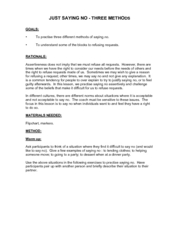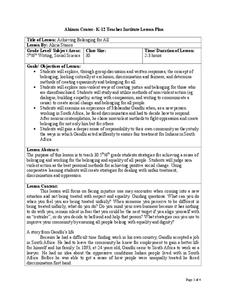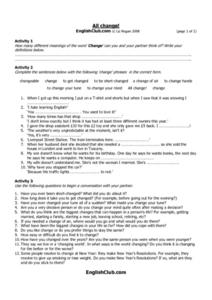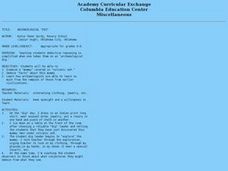Curated OER
Recognizing Strength
Students identify their individual strengths. In this values instructional activity, students create a collage to show their positive qualities as an individual. They share this to the group.
Curated OER
Anger (Part 1): Identifying Our Style
Students identify the two common sources of anger. In this psychology lesson, students discuss productive ways to express anger. They complete a reflection worksheet at the end of the lesson.
Curated OER
Expressing Anger
Students distinguish among the different styles of anger. In this psychology lesson plan, students evaluate their personal style of anger and its effectiveness. They brainstorm ways to control it.
Curated OER
Just Saying No-Three Methods
Students give examples of situations when it is difficult to say no. For this sociology lesson, students practice three methods of saying no. They role play some sample scenarios.
Curated OER
Initiating a Conversation
Students brainstorm some good conversation openers. In this communication lesson, students explain the benefits of good conversational skills. They practice conversing to each other in class.
Curated OER
Conflict and Communication
Learners brainstorm the common causes of conflict. For this psychology lesson, students discuss effective ways to respond to conflict situations. They evaluate how they communicate their wants and needs to others.
Curated OER
Achieving Belonging for All
Students explore ways of belonging. In this social science lesson, students discover non-violent ways for belonging similar to Mohandas Gandhi.
Curated OER
Giving Advice
In this peer advice worksheet, students choose a problem card and their peers give advice using the pattern provided on the worksheet.
Curated OER
Mystery World
In this personal decision making worksheet, students read 8 controversial statements. Students rate each according to how believable they think they are-- from 1 ("are you mad?!") to 5 ("of course it is possible"). Example: Some people...
Curated OER
It's on the Cards!
In this idioms worksheet, students, with a partner complete a variety of activities associated with idioms about cards and their many meanings in life.
Curated OER
Missing
In this missing learning exercise, students, with a partner, complete a variety of activities associated with terms and phrases having to do with the term missing.
Curated OER
Do You Have a GSOH?
In this humor worksheet, students, with a partner, read and discuss thirteen questions associated with having a good sense of humor and making fun of others.
Curated OER
Animals and Animosity
In this pet responsibility worksheet, students examine, discuss, and complete a variety of different activities associated with people's responsibility regarding their pets. Students access a website to gather responses to a question...
Curated OER
All Change!
In this language arts worksheet, students examine, discuss, and complete a variety of different activities associated with the word "change." Students consider the meaning of many phrases that contain the word "change," such as; "Change...
Curated OER
Communication--Conversation
In this communication and conversation worksheet, students web out the skills they think people need to have to be able to have successful conversations.
Curated OER
INTEGRITY
Learners explore the concept of acting with integrity and fairness and about the consequences of our actions including moral issues and attitudes. They inquire how to look beyond surface impressions and prejudice in oneself and others....
Curated OER
Are School Trips Too Risky?
Students analyze and chart what risks are involved on school field trips. Students devise a study trip to take and dissect at the end of their findings. Students scale the conditions of what a risk is and we can manage them in the future.
Curated OER
Boys' Attitudes To Work
Students examine the notion of what are students' images of manliness. Students test what represents success for students through a survey. Students ponder the issue can doing school work help you be manly.
Curated OER
Challenging Yourself
Students design a one-day challenge, try to do it, and then write about it. It could be giving up sweets, going for a three-mile run or being nicer to a sibling. They compose a writing piece describing their experience from taking on...
Curated OER
Effective Parent/Student/Teacher Communication
Sixth graders engage in a activity which address the concerns and issues around new 6th grade students arriving at middle school. They, parents and teachers use this strategy to effectuate good communication.
Curated OER
Building Strength Through Knowledge
Middle schoolers identify and confront fear in a positive manner. They critically analyze media information and build skills to enhance resiliency.
Curated OER
The Politics of Water
Students investigate the Governor's Kansas Water Initiative. Students study rivers, cities and reservoirs and how their location effects the importance of their water quality issues.
Curated OER
CHARTING A COURSE
Students model how a gyroscope works with string, an old phonograph record and crayon.
Curated OER
Archaeological "Dig"
Students examine a mummy covered in volcanic ash and deduce facts about the mummy. They deduce how archaeologists are able to learn so much from the remains of those from earlier civilizations.

























